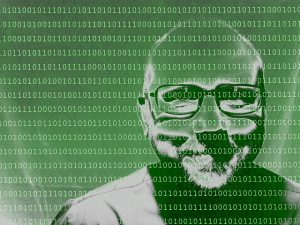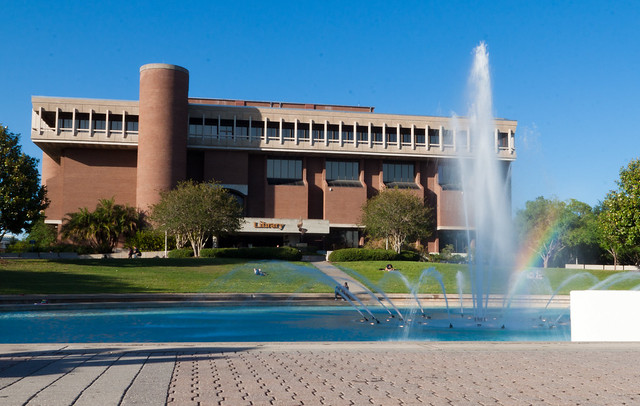
“Digital Trauman 02” by ryantrauman is licensed under CC BY-NC-SA 2.0
Digital Citizenship
Being a student at UVic has given me access to the resources of academia on journals, articles, books, and research projects of students past. It provides an avenue towards self study in navigating, reading, and inquiring on useful pieces of literature. Attending professional development workshops, meeting vendors, speaking to colleagues, participating in book studies, and implementing new ideas into the classroom has been my strategy for professional development. What has been missing is the deeper understanding of theoretical research in application to methodology. Starting the Master’s program has been my catalyst card for being a more informed member of digital citizenship, through creating a Professional Learning Network. As such, my blog is a personal reflection of my learning, through the wider lens of digital networks and open access, the strength of developing a professional learning network online, and bringing resources into the classroom. In addition, I will reflect on how information is used in our digital networks as a reader, researcher, the research available, and what is researched.
The Value of Open Access Digital Networks
While completing my undergraduate degree I needed to research a variety of articles. This required me to go to a couple of libraries on campus. I remember the database at one UBC library was different than another, so it required the physical presence of inputting the search on a computer at each location. Next, I would retrieve hard copies of journals and photocopy them. As a reader and future researcher, my ability to complete a degree off campus is achievable because of online access.
The access to information has been unlocked, but access to information is not fair to all educators. John Willinsky is an advocate for open access for all. His conversation highlighted to us that knowledge is a basic human right, and asks us, “Doesn’t it make sense to share public knowledge from a public university?” Private companies, as John explains, can make $3500 on 4 to 6 journals annually in which no editorial staff is paid for peer review. It sets up questions on how my experience in education, and my professional learning network over the last two decades might have been different if we had open access to research. Working in South Korea, my professional learning network was limited to the colleagues I was working with. John Willinsky has painted an optimistic picture of knowledge being freer to access. Over the last 21 years since starting the Public Knowledge Project (PKP) at least 25-30% of material is now legally free, but challenges loom with unlocking publicly researched content with publishers. In his article on The Academic Ethics of Open Access to Research and Scholarship, John Willinsky and Juan Pablo Alperin ask the reader about the,”moral good”(pg 221) on open access to knowledge. Notably, the open access movement has spurned illegal downloading which circumvents copyright laws, such as Sci-Hub. It brings up the question, as a reader and researcher, if I would access content illegally, after completing my masters degree, why should the University of Victoria online library be locked to me? No more student pass therefore no more access.
We had the opportunity to video conference with Dr. Martin Weller, in the classroom. He addressed his article, The Digital Scholar Revisited, which is on the subject of a book he published titled The Digital Scholar, where he used Boyer’s framework, and over-layed it with digital scholarship. Dr. Weller highlights the need to have the digital network be open access for open textbooks, massive online open courses (MOOCS), open access publications, open data systems, open pedagogy, and open science. It allows the reader of content to make modifications, adaptations, and changes of material, thereby changing their role from being passive to active. It paves way to making content that is more personalized to the learner, such as layering cultural content found in a First Nation’s community. Open access also means financial barriers on textbook purchases can be taken away, allowing a school to divert resources into student learning elsewhere. This means I can change my role from a reader, to being dynamic and making altered content, thereby doing research of the community I am in, reflecting how to best meet the needs of my learners, and being the researcher of the results. In addition, the individual can add to the public sphere of knowledge, in which others can undergo their own transformations of the open curriculum. With the knowledge of open access and moving into the sphere of the researcher for completing a master’s degree, it is important for me to create open access to content that is created as a resource that can be mixed, shared, and transformed to enrich the public body of knowledge.

https://i1.wp.com/connectivism.madeleinebrookes.com/wp-content/uploads/2017/09/BoyerModelScholarship.png
The Professional Learning Network (PLN)
The introductory graduate courses themselves are a framework for PLN, but the time needed will go beyond the scope of 3 weeks being in a class. It takes time, change of habits, and learning new digital tools to engage with a learning community. At the present time, I am more of a reader, in Twitter terms a lurker, in which I digest information but don’t engage. Moving into August and finishing course work, it will give me the time to be more engaged and build a PLN. David Truss highlights in his Twitter EDU online book that you need to put time into your social network. Twitter is the current tool for many academics. It is also a useful networking tool, and a place to communicate new ideas or have forms of discussion.
Professional Development usually occurred for me in the confines of a classroom that hosted an activity. We received a choice of specific guest speakers that were chosen or volunteered to present workshops in the school district. However, teachers are beginning to use professional development online. Ekaterena Tour has a focus study on the use of online PLN’s of teachers titled Teachers’ Personal Learning Networks (PLNs): Exploring the Nature of Self-Initiated Professional Learning Online. She notes teachers who have self initiated online PLN networks have experiences that are social, personalized to the educator, are active members in their network with giving and receiving feedback, have ongoing communication, and blend personal and online contact. An online PLN gives the individual,”mobility, freedom and access to like-minded people supported by technologies provides opportunities for ongoing professional learning” ( p. 16). Starting the Masters program has jump started my online network of finding like-minded individuals. Over the last 3 days we have heard presentations from other students in the class. Notably, the students in class are not just readers, but researchers, who are researching specific pedagogy that reflects these professional educators interests in their field of specialization. It gave me the opportunity to hear other frameworks, interests, and time to reflect on my own personal practice in a multitude of ways. My peers have created blogs, online sources, Twitter accounts, a WhatsApp online social network, and in my case video conferencing in large and smaller forums. In the last few days I have gained invaluable information on my areas of interest, such as inquiry-based learning in Fort St. James, cross curricular activities that can be developed with 3-D printing, and opportunities collaborating with educators outside the province of British Columbia.
Digital Citizenship in the Classroom
The International Society for Technology in Education (ISTE) has an excellent framework for administrators, teachers and students in fostering the use of technology and digital citizenship. Within this framework I am researching how to use inquiry-base learning, and First Nations ways of knowing into the classroom, and how technology can be used to bridge communities which will foster collaboration between learners. I appreciated listening to Dr. Pete Shauneen who presented a First Nations perspective of decolonizing our educational system, and made a valuable point from her article, Idle No More: Radical Indigeneity in Teacher Education, that,”learners come to the classroom with rich identities which could drive curriculum choice” (Pg 62). I feel we can accomplish this through an inquiry-based model that uses technology to bring learners together, and gives choice to our learners. In essence, making our students researchers instead of readers.
Conclusion
Having open access networks, allows for all members of the educational community, to benefit from the collective knowledge. Professional Learning Networks are enriched from open access because of the ability to share, collaborate, and transform ideas to educators in the classroom. Educators can then expand the horizons of digital citizenship for the learners. The process of being a reader of open access information, a researcher using an open digital network to learn from the research of other educators, reflecting and transforming researched material into personal learning for the student. This contributes to an intertwined digital network of the 4 R’s together which creates a powerful vehicle towards allowing my goal as a researcher to be obtained, in completing the Master’s of Educational Technology program at the University of Victoria.



Recent Comments